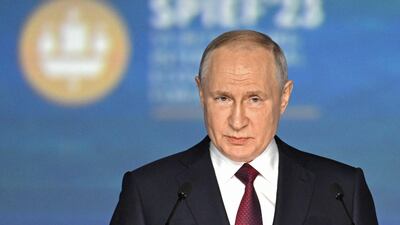Russia's President Vladimir Putin confirmed on Friday that the first tranche of tactical nuclear weapons has been delivered to Belarus, escalating geopolitical tension.
The development comes three months after Mr Putin initially announced the plan, a move that sparked widespread concern among the US and its allies amid the ongoing conflict in Ukraine.
“The first nuclear charges were delivered to the territory of Belarus. But only the first,” Mr Putin declared at the St Petersburg International Economic Forum.
“This is the first part. But by the end of the summer, by the end of the year, we will complete this work.”
US Secretary of State Antony Blinken, responding to the news, maintained that Washington sees no immediate need to revise its defensive strategy as a result of the new deployment.
“We have no reason to adjust our own nuclear posture,” Mr Blinken said at a press conference in Washington.
“We don’t see any indications that Russia is preparing to use a nuclear weapon.”
Mr Putin d revealed in March that Russia planned to station tactical nuclear weapons in Belarus, a move that drew criticism from the US and European nations.
Suggestions from Kremlin officials since the February 2022 invasion of Ukraine that they might send the arms elicited muted warnings even from Russia’s allies China and India.
Despite these concerns, Mr Putin said on Friday that he perceives “no need” for Russia to use nuclear weapons presently.

He contended that these arms “are created to ensure our security in the broadest sense of the word, the existence of the Russian state”.
Mr Putin clarified that despite sending the weapons to Belarus, Russia was fulfilling its non-proliferation commitments by retaining control over the weapons.
Belarusian troops, however, have been trained in the “storage and use of tactical special munitions”.
The Russian leader also mentioned that he has consistently turned down US appeals to curtail its tactical nuclear weapons stockpile.
While Russia has a greater number of such weapons than the US and its allies, Mr Putin's spokesman said that this does not imply a refusal to engage in arms control talks.
Meanwhile, Belarusian President Alexander Lukashenko suggested earlier this week that the Russian weapons had already been sent, even though Mr Putin had previously stated the delivery would start the following month.
Responding to Mr Lukashenko's actions, Mr Blinken accused him of “making irresponsible, provocative choices to cede control of Belarus’s sovereignty against the will of the Belarusian people”.
He highlighted the irony of Mr Putin's decision to send nuclear weapons in Belarus, a neighbouring state that relinquished its nuclear arsenal following the dissolution of the Soviet Union, as Mr Putin had used Ukraine's potential acquisition of nuclear weapons as a pretext for his invasion.
Belarus, like Ukraine and Kazakhstan, renounced the atomic weapons that had been stationed in their territories after the collapse of the Soviet Union.


